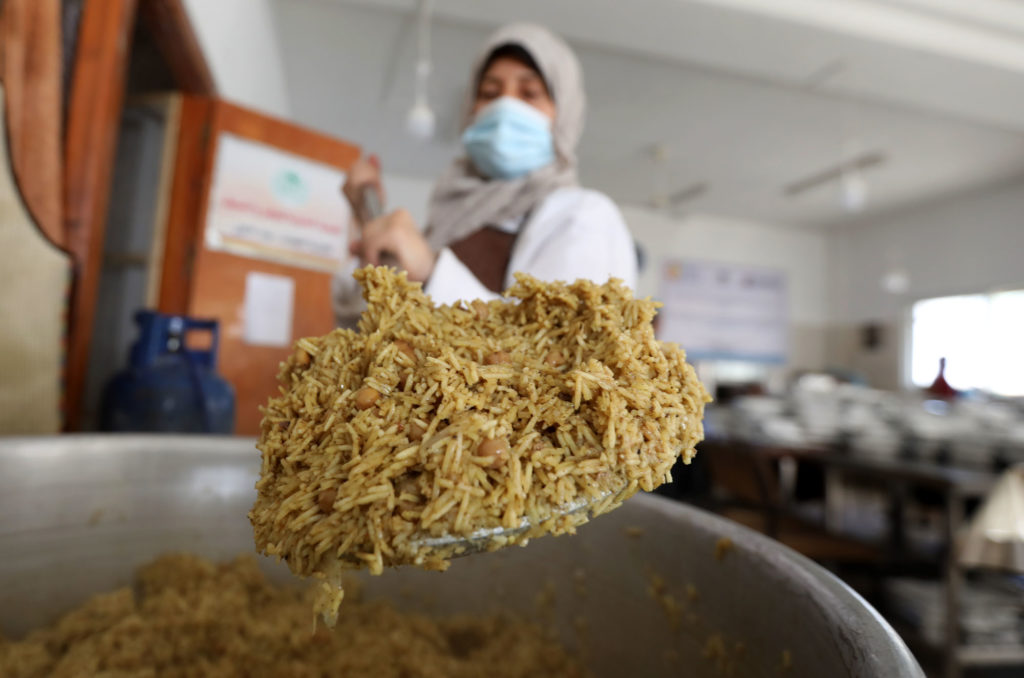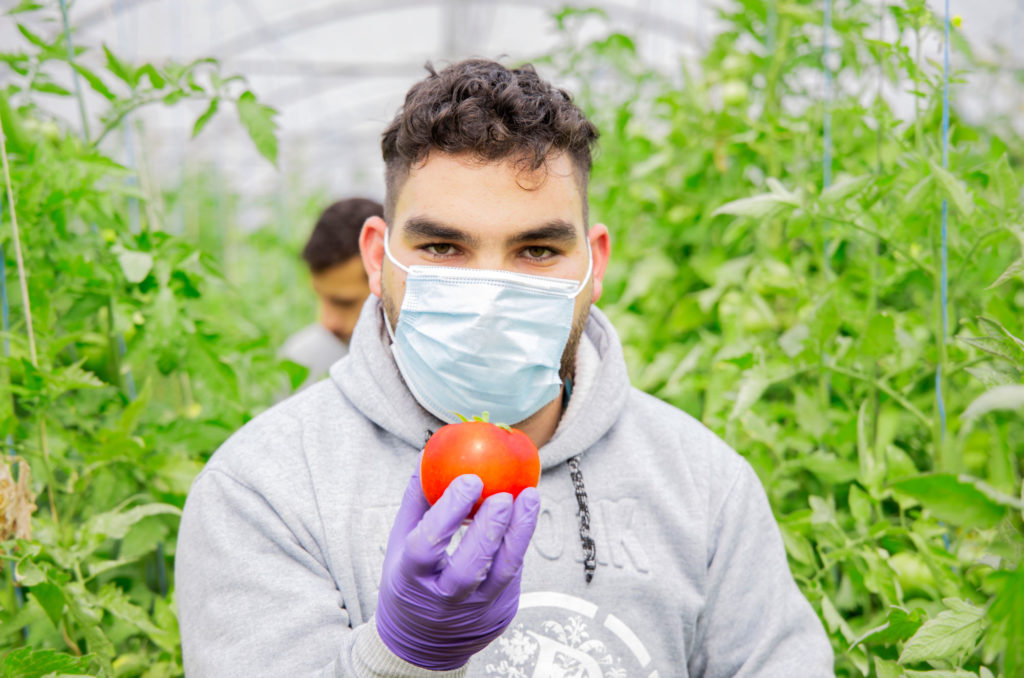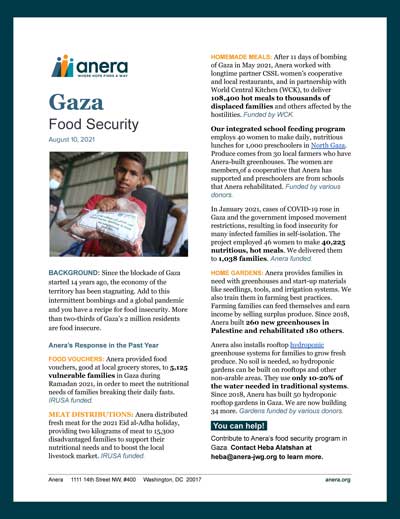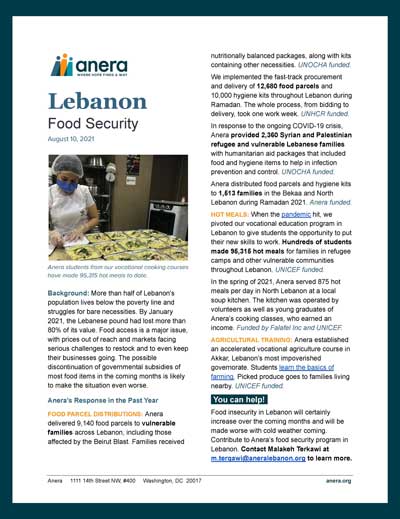Combating Food Insecurity in Gaza and Lebanon
Posted in: Programs
GAZA


Background
Since the blockade of Gaza started 14 years ago, the economy of the territory has been stagnating. Add to this intermittent bombings and a global pandemic and you have a recipe for food insecurity. More than two-thirds of Gaza’s 2 million residents are food insecure.
Anera’s Response This Past Year
Food Vouchers
Anera provided food vouchers, good at local grocery stores, to 5,125 vulnerable families in Gaza during Ramadan 2021, in order to meet the nutritional needs of families breaking their daily fasts. IRUSA funded.
Meat Distributions
Anera distributed fresh meat for the 2021 Eid al-Adha holiday, providing two kilograms of meat to 15,300 disadvantaged families to support their nutritional needs and to boost the local livestock market. IRUSA funded.
Hot Meals
After 11 days of bombing of Gaza in May 2021, Anera worked with longtime partner CSSL women’s cooperative and local restaurants, and in partnership with World Central Kitchen (WCK), to deliver 108,400 hot meals to thousands of displaced families and others affected by the hostilities. Funded by WCK.
Our integrated school feeding program employs 40 women to make daily, nutritious lunches for 1,000 preschoolers in North Gaza. Produce comes from 30 local farmers who have Anera-built greenhouses. The women are members of a cooperative that Anera has supported and preschoolers are from schools that Anera rehabilitated. Funded by various donors.
In January 2021, cases of COVID-19 rose in Gaza and the government imposed movement restrictions, resulting in food insecurity for many infected families in self-isolation. The project employed 46 women to make 40,225 nutritious, hot meals. We delivered them to 1,038 families. Anera funded.
Home Gardens
Anera provides families in need with greenhouses and start-up materials like seedlings, tools, and irrigation systems. We also train them in farming best practices. Farming families can feed themselves and earn income by selling surplus produce. Since 2018, Anera built 260 new greenhouses in Palestine and rehabilitated 180 others.
Anera also installs rooftop hydroponic greenhouse systems for families to grow fresh produce. No soil is needed, so hydroponic gardens can be built on rooftops and other non-arable areas. They use only 10-20% of the water needed in traditional systems. Since 2018, Anera has built 50 hydroponic rooftop gardens in Gaza. We are now building 34 more. Gardens funded by a variety of donors.
LEBANON


Background
More than half of Lebanon’s population lives below the poverty line and struggles for bare necessities. By January 2021, the Lebanese pound had lost more than 80% of its value. Food access is a major issue, with prices out of reach and markets facing serious challenges to restock and to even keep their businesses going. The possible discontinuation of governmental subsidies of most food items in the coming months is likely to make the situation even worse.
Anera’s Response in the Past Year
Food Parcel Distributions
Anera delivered 9,140 food parcels to vulnerable families across Lebanon, including those affected by the Beirut Blast. Families received nutritionally balanced packages, along with kits containing other necessities. UNOCHA funded.
We implemented the fast-track procurement and delivery of 12,680 food parcels and 10,000 hygiene kits throughout Lebanon during Ramadan. The whole process, from bidding to delivery, took one work week. UNHCR funded.
In response to the ongoing COVID-19 crisis, Anera provided 2,360 Syrian and Palestinian refugee and vulnerable Lebanese families with humanitarian aid packages that included food and hygiene items to help in infection prevention and control. UNOCHA funded.
Anera distributed food parcels and hygiene kits to 1,513 families in the Bekaa and North Lebanon during Ramadan 2021. Anera funded.
Hot Meals
When the pandemic hit, we pivoted our vocational education program in Lebanon to give students the opportunity to put their new skills to work. Hundreds of students made 95,315 hot meals for families in refugee camps and other vulnerable communities throughout Lebanon. UNICEF funded.
In the spring of 2021, Anera served 875 hot meals per day in North Lebanon at a local soup kitchen. The kitchen was operated by volunteers as well as young graduates of Anera’s cooking classes, who earned an income. Funded by Falafel Inc and UNICEF.
Agricultural Training
Anera established an accelerated vocational agriculture course in Akkar, Lebanon’s most impoverished governorate. Students learn the basics of farming. Picked produce goes to families living nearby. UNICEF funded.
OUR BLOG
Related
Part of a series on the impact of the war on all sectors of economic life within Gaza, Anera’s immediate response and plans for the future. Other posts cover housing, education, WASH, health and food production systems. Livelihood Recovery In Gaza, 57 years of occupation and…
InterAction and 50 Member CEOs, some of whom have organizations that work in Gaza, urge President Biden to take decisive and actionable steps to alleviate the humanitarian crisis in Gaza. Detailed within this letter are specific steps and commitments that…


